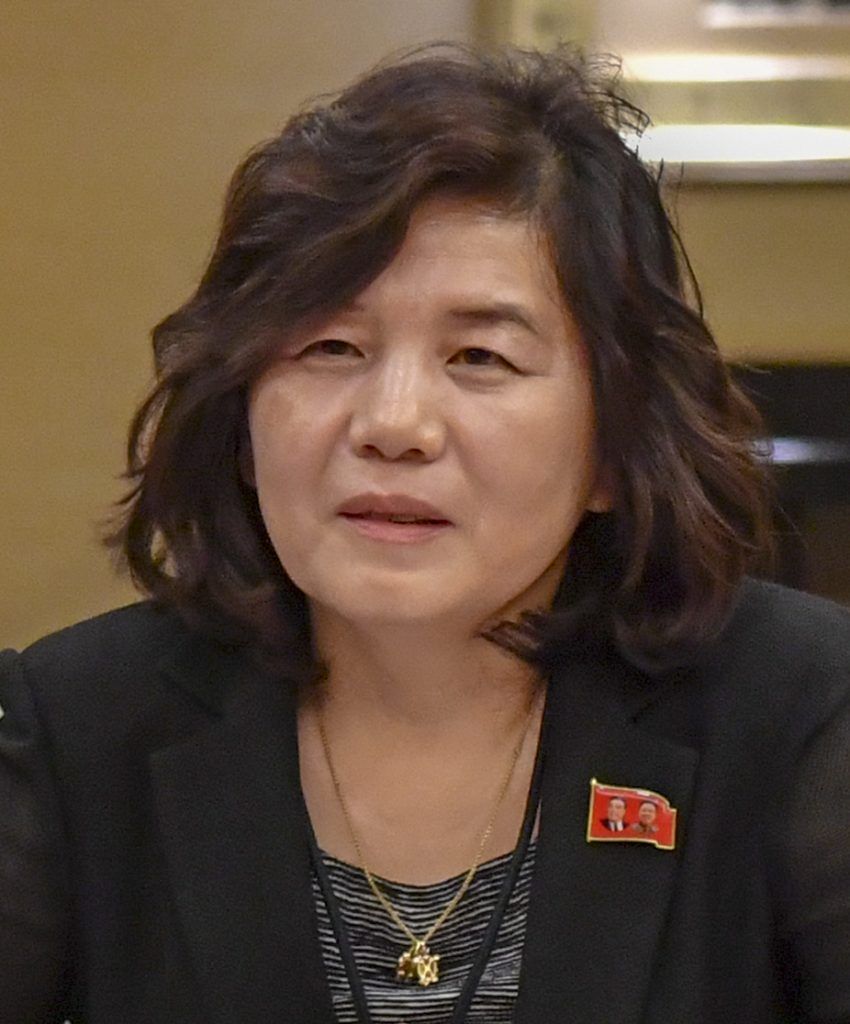Hanoi Summit: Where were the women?
By Rachel Emond | March 7, 2019
 Choe Son-hui is the highest-ranking female official in the North Korean government. Credit: US State Department
Choe Son-hui is the highest-ranking female official in the North Korean government. Credit: US State Department
Based on the pictures from the second Trump-Kim summit, it looks like the women who spent the most time in the room where the leaders met were the interpreters.
This is a far cry from previous administrations that had women running or helping to run nuclear negotiations—Madeleine Albright, Condoleezza Rice, Wendy Sherman, and Rose Gottemoeller, to name a few.
No doubt, there were women present at the margins in Hanoi. White House Press Secretary Sarah Huckabee Sanders was in the room with Vietnamese officials when the Trump administration pitched arms exports from the United States to their hosts. Kim Yo-jong—Kim Jong-un’s younger sister—was spotted holding an ashtray for the North Korean leader and mostly stayed not more than a few feet from her brother throughout the summit. Other women were serving in support roles back in Washington, but that’s not the same as being at the table.
So who are the women that have been most involved in the Trump-Kim summit process so far?
Allison Hooker. A former employee of the State Department, Hooker worked for the Bureau of Intelligence and Research on projects related to North Korean nuclear policy. First assigned to the National Security Council during President Obama’s administration, Hooker was appointed by the Trump administration to a permanent position as the Korea specialist at the National Security Council. Hooker is one of several Americans—including Sung Kim and Randall Schriver—who have significant experience dealing directly with officials from the Koreas, and were tasked with preparatory talks ahead of the summit negotiations.
On December 24, 2018, President Trump tweeted a photo of himself, Stephen Biegun (the administration’s special representative for North Korea), and Allison Hooker from the Oval Office, stating he was “looking forward to [his] next summit with Chairman Kim!” Generally, Hooker has kept a low profile throughout her tenure at the State Department and the National Security Council, but was spotted with Biegun in Hanoi a few days before Trump’s meeting with Kim was set to begin. Hooker’s substantive diplomatic experience should make her skills respected and valued.
Hooker previously traveled to North Korea alongside former Director of National Intelligence James Clapper to secure the release of American prisoners, and traveled to South Korea with Ivanka Trump during the 2018 Olympics. Her extensive knowledge of Korean affairs and direct experience interacting with both North and South Korean officials gives her a clear and nuanced understanding of historical context. Her advice and counsel would have been useful at the negotiating tables in Singapore and Hanoi.
Choe Son-hui. As the vice minister of foreign affairs, Choe is the highest-ranking female official in the North Korean government. She also currently serves as the state’s lead official on relations with the United States. Choe got her start as an interpreter and has significant experience acting in that capacity for the Ministry of Foreign Affairs, including during visits by former Presidents Clinton and Carter to Pyongyang.
Choe has consistently held the position that North Korea possesses nuclear weapons to defend its sovereignty. When the Trump administration threatened to cancel the meeting in Singapore if North Korea didn’t meet certain unspecified criteria, she said, “We will neither beg the U.S. for dialogue nor take the trouble to persuade them if they do not want to sit together with us. Whether the U.S. will meet us at a meeting room or encounter us at nuclear-to-nuclear showdown is entirely dependent on the decision… of the U.S.”
With a similar background to Hooker, Choe has both technical knowledge of North American affairs and hands-on experience with US officials at the working level. Not only have her diplomatic skills been noted by experts, she has also made specific statements regarding her expectations of what the US-North Korea relationship should look like, including scaling back the US military presence in Korea and Japan. In Hanoi, she was reportedly in the middle of a final back-and-forth between President Trump and Chairman Kim—relaying messages, questions, and clarifications from one leader to another as the two teams attempted to make a last-minute deal. If empowered to participate at the highest levels, Choe would have brought diplomatic experience and technical verification knowledge to the table, which could have increased the likelihood of reaching an agreement between North Korea and the United States.
Kim Yo-jong. Partly because she is Kim Jong-un’s sister, many North Korean experts believe that she is the most powerful woman in North Korea, asserting that she has significant political influence on her brother. Kim has taken a prominent role in curating her brother’s image as a leader for the Workers’ Party Department of Propaganda and Agitation. In 2014, she reportedly took over running the country briefly when her brother fell ill, and she was instrumental in the development of the meeting between Kim Jong-un and South Korean President Moon Jae-in. She was the only woman on the team of six North Korean delegates that traveled to South Korea in April 2018, but she was not vocal during the meeting and instead was seen taking copious notes.
Though Kim Yo-jong has less diplomatic experience than Hooker or Choe, her role as a rising leader in the North Korean regime is significant. Chairman Kim seems to value her judgment and skills in managing his public persona, so excluding her from key meetings was an odd move.
Though all three of these women have substantial experience and expertise, none of them was present during the private, bilateral meeting between Trump, Kim Jong-un, and their most trusted advisers. Aside from two female interpreters, the negotiating table sat only men during this critical moment. To be clear, interpreters are incredibly important to effective, successful negotiations, but they are not there to shape policy outcomes. Peace negotiations need both policy experts and women present at the table, and even though there were a number of female experts at the ready, none were present at the negotiating table in Hanoi.
The new normal: empowered women. In September of last year, at a Women Foreign Ministers’ Meeting, Federica Mogherini, the High Representative of the European Union for Foreign Affairs and Security Policy, stated “…women are generally perceived as victims: victims of conflict, victims of violence. And, indeed, they are… But they are also key players in society, in the economy, in institutions, in foreign policy, in defense and many other issues. So we wanted to start showing the ‘new normal’: many women in power, taking responsibility for decisions. While representing diverse societies and perspectives, we all agreed that women’s political and economic empowerment is critical to building a more prosperous, inclusive, and safer world.”
By excluding women from active negotiating roles, Washington and Pyongyang reduced their possible chances for success. There is no excuse for this, as there are scores of women experts on North Korea nuclear policy, and more who focus on the peace process. For example, Women Cross DMZ—a group of female activists working to achieve a peaceful end to the Korean conflict—places a special emphasis on the role that women should play in peace negotiations. Their philosophy is not baseless. According to research, peace agreements that are signed by women feature higher-quality content and higher rates of implementation than those not signed by women, and therefore lead to longer-lasting agreements. On the whole, women are also more likely to insist that parties stay at the table until an agreement is made. There were a lot of factors that played into the outcome (or lack thereof) of the summit in Hanoi, but to ensure future success, leaders in Washington and Pyongyang should think about bringing more women to the next negotiations.
With International Women’s Day coming up at the end of this week, and the 2019 theme being #BalanceforBetter, it’s important to note that despite progress, hard security policy—nuclear policy in particular—suffers from a gender imbalance.
As we move forward after Hanoi, I hope to see more women represented at future summits, and in roles that take advantage of skills beyond interpretation or ashtray-holding. It’s hard to see how the United States can build a successful deal to reduce the nuclear threats posed by the North Korean nuclear program, as well as tensions in the region, if the administration leaves the talents of half the population on the sidelines.
Together, we make the world safer.
The Bulletin elevates expert voices above the noise. But as an independent nonprofit organization, our operations depend on the support of readers like you. Help us continue to deliver quality journalism that holds leaders accountable. Your support of our work at any level is important. In return, we promise our coverage will be understandable, influential, vigilant, solution-oriented, and fair-minded. Together we can make a difference.
Keywords: Hanoi Summit, North Korea, women
Topics: Nuclear Risk, Nuclear Weapons, Voices of Tomorrow















Huh, I didn’t hear about the lack of women in the administration when President Obama was president, and he had record low numbers of women, also he paid them less than men with equivalent qualifications.
Richard chose not to include any source for his claims. In fact, the Obama administration had many women in prominent national security positions. And the White House gender pay gap tripled in the first year of the Trump administration: https://www.washingtonpost.com/news/wonk/wp/2017/07/05/white-house-gender-pay-gap-more-than-triples-under-trump/?utm_term=.7c28e1da9ec5
The Republican National Committee has falsely claimed that Trump appointed more women “than previous administrations,” but there are no facts to support that. By any measure, Trump lags behind not only Obama but also Clinton and possibly George W. Bush in terms of the percentage of female appointments. https://www.washingtonpost.com/news/fact-checker/wp/2018/03/13/lara-trumps-claim-that-trump-has-appointed-more-women-than-any-other-president/?utm_term=.569b4011c362